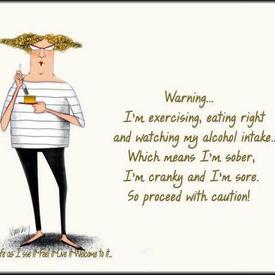I'm eating too much Protein?
Replies
-
Protein is a VERY good thing to have....Aim for 1 gram per pound of body weight or 1.5 grams per pound of lean mass. MFP calculates low on protein - I go over every day. It also helps you to feel full longer & helps you keep the muscle that you do have. :happy:0
-
I am so glad i found this post because i am having the same problem! My fat, calorie and carb intake are great. But I just finished lunch and my protein is at 0! It's not even dinner time yet. But i do agree with other people's replies that too much protein is not a bad thing at all! When i went to medical assisting school.. i think i even did a research paper on nutrition, might have to pull that back up and read it again!
I will tell you what though, i am loving using a food diary! I never have and this fitness pal thing is awesome! In just a 4 days of doing this, i feel awesome!!!0 -
Check out this article. It will help you to chill out about the protein. Many of us eat higher protein to lose more weight. The ending summary is to do about 120 a day, if I remember right. But read it through.
http://www.webmd.com/diet/guide/high-protein-diet-weight-loss
This keeps coming up and I keep posing it for folks... so maybe I'll go do a blanket post on protein.0 -
Most likely not, MFP levels for protein are way low! I try to eat more than my daily protein allowance. Protein is good for you!0
-
I never get enough-- I would gladly take some of yours.0
-
I'm a vegetarian and even I go over the protein sometimes! So I wouldn't worry too much.0
-
protein makes you hawt. true story.0
-
I aim for at least 100g of protein a day. Most days I get a lot more than that. Protein is good for you!0
-
this is a setup0
-
Seems like everyone agrees that the MFP recommendations for protein are way too low. I set mine at 60%, which works out at 250grams per day. Important if you lift weights.0
-
My macro nutrient breakdown is always over: on protein and under on carbs and fat. Protein makes me feel "fuller". Also, I work out several days a week and need the protein to have my "little muscles" recover... I haven't been working out very long. I began by just walking but now am getting a bit toned from working out in the gym. Every little bit helps!:flowerforyou:0
-
wish I could just get close to my protein allowance/day....maybe I should try more greek yogurt!0
-
I don't think you can eat too much protein.0
-
If you add more protein to your diet without removing carbs or fat to compensate you will then be eating too many calories. Have you adjusted your calorie intake to reflect your weight loss?0
-
I just posted a similar question because I'm having the same issue. I don't however think it would be affecting your weight loss...it defiantly hasn't for me (lost 50 pounds in the last 7 months)
After reading under your post I think I need to adjust my % as well!
Good luck!0 -
eat more protein0
-
You can change your ratios to 40-30-30 - it's pre-set for you to get 55% from carbs which is definitely too much.
40 carbs
30 protein
30 fat
Great macros... they are serving me well. go to your food diary, goal, change goals, manual...
will give you more protein and less carbs but still a good sensible amount...
Hope this helps! x0 -
This is from a fairly well-respected nutrition website.
Protein: Finding Your Optimal Level
Suppose you want to lose weight. That means you should probably follow some simple guidelines like eating less sugar. But research also indicates that eating more protein can help you towards this goal.
Scientists at the University of Illinois designed a weight-loss program in which one group ate the RDA for protein, while a matched group ate two times the RDA recommended amount. Both groups also exercised. The RDA group lost 12 pounds of fat in 16 weeks, while the higher-protein group lost nearly 20 pounds during the same time period. The RDA group also lost two pounds of muscle. This suggests that you need more protein during a weight-loss program, both to lose fat and to preserve your muscle.
“But wait,” protein naysayers will bark. “Won’t eating all of that protein jeopardize your cardiovascular system? It’s bound to clog your arteries.”
To put that concern to the test, researchers pooled together a group of subjects with high blood pressure and less-than-ideal cholesterol, and tested the impact of adding more protein to their diets. (The OmniHeart study) No one was allowed to gain or lose weight during the test, so any changes couldn’t be chalked up to the benefits of dropping a few pounds. Some subjects ate a diet with 18 percent of their total calories coming from protein, which is pretty close to the USDA’s recommended amount. A second group upped their protein intake to 28 percent.
What happened?
The higher-protein group showed better health across the board. People in that group had greater decreases in blood pressure, LDL (“bad”) cholesterol, and triglyceride levels. What’s more, their estimated 10-year risk of heart disease decreased compared to those on the lower protein track. Had these subjects been allowed to lose weight, the results may have been even more dramatic.
So what is optimal? If you go by science, about 30 percent of your calories should come from protein. At that level, you won’t have to worry about deficiencies, and you’ll know you’re getting enough of the nutrient to lose fat while also improving your heart health. Have some protein at each of your meals and snacks, and you’ll hit the target with ease.
Protein and Energy
Allow me to pause our protein discussion to talk about your blood sugar. When you eat a meal, your body breaks down carbohydrates into individual sugars and dumps them into your bloodstream. It doesn’t matter if those carbs come from broccoli or biscuits. Your body needs energy, and this is how it’s produced. The result is an increase in your blood-sugar levels.
Now, your body is very particular about blood sugar, just like Goldilocks was particular about her porridge – it wants your blood-sugar levels to be just right (70 to 99 milligrams per deciliter, for those of you interested in numbers).
When you eat a big meal, your blood sugar increases a lot. This makes your body freak out. Your pancreas responds by releasing the hormone insulin. Insulin’s job in this case is very simple: Get the excess sugar out of your blood. It does this by going “door to door” throughout your body, knocking on the entry points of muscle and fat cells to see if they’ll open and take in some sugar until blood levels return to just right.
If your body overreacts, your pancreas will release too much insulin. That insulin will knock on too many doors, pulling too much sugar out of your blood. Now you have a new problem: hypoglycemia (hypo = low; glycemia = sugar). You’ll start to feel tired, or hungry, or perhaps both. You get tired because your body’s most immediate energy source, the sugar in your blood, is suddenly depleted. You want to eat because low blood sugar is one of your body’s most powerful hunger signals. Your body will crave carb-rich foods to get your blood sugar back up again, even if you just ate.
Here’s how protein plays into the equation. Protein can help displace those carbs. The amino acids that form the building blocks of protein provoke a much-lower insulin response than the one triggered by a high-carb meal. So consuming more protein will have a less dramatic affect on your blood sugar.
Protein also triggers the release of a hormone called glucagon. Glucagon is the yin to insulin’s yang. While insulin takes sugar from your blood and pushes it into muscle and fat cells, glucagon gets your fat cells to release stored fat into your bloodstream, where it provides fuel for your muscles, brain, and everything else that uses energy. Meaning that of all the types of food you can eat, protein is the most efficient for your body: It controls insulin and helps incinerate fat.
A Better Burn
When we talk about about burning calories, we tend to focus on exercise. But our bodies are constantly using energy throughout the day and night. Even when we’re sleeping, we’re still breathing and pumping blood. Our brains are dreaming. We’re still digesting food and finding places to store it. And not all foods are digested equally.
The components of food—protein, carbohydrates, and fats —require different amounts of energy to digest and process, just as different types and intensities of exercise burn more or fewer calories. Scientists call this metabolic cost the thermic effect of food (TEF). Protein has a much higher TEF than carbs or fat. That is, simply eating more protein means your body is burning more calories during the process of digestion. In some cases, doubling your protein intake will bump up the number of calories you burn throughout the day. That’s one reason why protein, all by itself, helps you lose weight.
The Building Blocks of Muscle
During digestion, your body breaks down protein into individual amino acids. It uses them in many different ways, putting them together like a child combines Legos to build a castle. (Fortunately, your body does this in a more consistent way than your average elementary schooler.) These castles are your muscle tissue. To build them, you need an adequate supply of building blocks.
But imagine that the Legos did more than just stack on top of each other – they took part in your castle construction by telling you when to build your towers and walls. That’s what the amino acids in protein do. They aren’t just inert pieces of food waiting to be broken down. They actively signal your body to build muscle.
The most important amino acid in this process is leucine, which is found in just about every protein-containing food you’d ever eat. But in order for leucine to optimize and maximize your ability to turn protein into muscle there needs to be a certain amount present—a protein threshold, if you will. Scientists estimate that this threshold is about 30 grams of protein. You can build muscle with less than this amount or more, but this dosage is what research has found is ideal for optimal functioning.
Once built, muscle is metabolically active, meaning it burns more calories than fat even while you’re at rest. (It scorches through a lot more when you’re active.) And the more muscle you have, the more effective and efficient you become at every activity, which helps you burn more calories.
The All-Day Protein Diet
I recommend consuming lean protein throughout the day. Here are some quick and easy ways to work this essential nutrient into every meal.
*BREAKFAST: eggs, egg whites, lean breakfast meats, Greek yogurt, smoothies with protein powder.
*LUNCH OR DINNER: salmon, chicken breasts, extra-lean ground turkey, extra-lean ground beef, turkey or chicken sausage, lean beef (top round, shoulder roast, skirt steak), tuna, cod, tilapia, shrimp, tofu.
*SNACKS: Nuts and seeds, roasted edamame beans, protein bars (pick bars with at least 10 grams of protein and no more than 30 grams of carbs), protein shakes.0 -
I don't think you can eat too much protein.
at 40% protein I started gaining weight at 30% I'm losing well. You can have too much of a great thing! know everyone is different but that's my experience! x0 -
If you've only been tracking for 2 days or over protein for 2 days then you're not really gonna see a change relaistically!0
-
This is from a fairly well-respected nutrition website.
Protein: Finding Your Optimal Level
Suppose you want to lose weight. That means you should probably follow some simple guidelines like eating less sugar. But research also indicates that eating more protein can help you towards this goal.
Scientists at the University of Illinois designed a weight-loss program in which one group ate the RDA for protein, while a matched group ate two times the RDA recommended amount. Both groups also exercised. The RDA group lost 12 pounds of fat in 16 weeks, while the higher-protein group lost nearly 20 pounds during the same time period. The RDA group also lost two pounds of muscle. This suggests that you need more protein during a weight-loss program, both to lose fat and to preserve your muscle.
“But wait,” protein naysayers will bark. “Won’t eating all of that protein jeopardize your cardiovascular system? It’s bound to clog your arteries.”
To put that concern to the test, researchers pooled together a group of subjects with high blood pressure and less-than-ideal cholesterol, and tested the impact of adding more protein to their diets. (The OmniHeart study) No one was allowed to gain or lose weight during the test, so any changes couldn’t be chalked up to the benefits of dropping a few pounds. Some subjects ate a diet with 18 percent of their total calories coming from protein, which is pretty close to the USDA’s recommended amount. A second group upped their protein intake to 28 percent.
What happened?
The higher-protein group showed better health across the board. People in that group had greater decreases in blood pressure, LDL (“bad”) cholesterol, and triglyceride levels. What’s more, their estimated 10-year risk of heart disease decreased compared to those on the lower protein track. Had these subjects been allowed to lose weight, the results may have been even more dramatic.
So what is optimal? If you go by science, about 30 percent of your calories should come from protein. At that level, you won’t have to worry about deficiencies, and you’ll know you’re getting enough of the nutrient to lose fat while also improving your heart health. Have some protein at each of your meals and snacks, and you’ll hit the target with ease.
Protein and Energy
Allow me to pause our protein discussion to talk about your blood sugar. When you eat a meal, your body breaks down carbohydrates into individual sugars and dumps them into your bloodstream. It doesn’t matter if those carbs come from broccoli or biscuits. Your body needs energy, and this is how it’s produced. The result is an increase in your blood-sugar levels.
Now, your body is very particular about blood sugar, just like Goldilocks was particular about her porridge – it wants your blood-sugar levels to be just right (70 to 99 milligrams per deciliter, for those of you interested in numbers).
When you eat a big meal, your blood sugar increases a lot. This makes your body freak out. Your pancreas responds by releasing the hormone insulin. Insulin’s job in this case is very simple: Get the excess sugar out of your blood. It does this by going “door to door” throughout your body, knocking on the entry points of muscle and fat cells to see if they’ll open and take in some sugar until blood levels return to just right.
If your body overreacts, your pancreas will release too much insulin. That insulin will knock on too many doors, pulling too much sugar out of your blood. Now you have a new problem: hypoglycemia (hypo = low; glycemia = sugar). You’ll start to feel tired, or hungry, or perhaps both. You get tired because your body’s most immediate energy source, the sugar in your blood, is suddenly depleted. You want to eat because low blood sugar is one of your body’s most powerful hunger signals. Your body will crave carb-rich foods to get your blood sugar back up again, even if you just ate.
Here’s how protein plays into the equation. Protein can help displace those carbs. The amino acids that form the building blocks of protein provoke a much-lower insulin response than the one triggered by a high-carb meal. So consuming more protein will have a less dramatic affect on your blood sugar.
Protein also triggers the release of a hormone called glucagon. Glucagon is the yin to insulin’s yang. While insulin takes sugar from your blood and pushes it into muscle and fat cells, glucagon gets your fat cells to release stored fat into your bloodstream, where it provides fuel for your muscles, brain, and everything else that uses energy. Meaning that of all the types of food you can eat, protein is the most efficient for your body: It controls insulin and helps incinerate fat.
A Better Burn
When we talk about about burning calories, we tend to focus on exercise. But our bodies are constantly using energy throughout the day and night. Even when we’re sleeping, we’re still breathing and pumping blood. Our brains are dreaming. We’re still digesting food and finding places to store it. And not all foods are digested equally.
The components of food—protein, carbohydrates, and fats —require different amounts of energy to digest and process, just as different types and intensities of exercise burn more or fewer calories. Scientists call this metabolic cost the thermic effect of food (TEF). Protein has a much higher TEF than carbs or fat. That is, simply eating more protein means your body is burning more calories during the process of digestion. In some cases, doubling your protein intake will bump up the number of calories you burn throughout the day. That’s one reason why protein, all by itself, helps you lose weight.
The Building Blocks of Muscle
During digestion, your body breaks down protein into individual amino acids. It uses them in many different ways, putting them together like a child combines Legos to build a castle. (Fortunately, your body does this in a more consistent way than your average elementary schooler.) These castles are your muscle tissue. To build them, you need an adequate supply of building blocks.
But imagine that the Legos did more than just stack on top of each other – they took part in your castle construction by telling you when to build your towers and walls. That’s what the amino acids in protein do. They aren’t just inert pieces of food waiting to be broken down. They actively signal your body to build muscle.
The most important amino acid in this process is leucine, which is found in just about every protein-containing food you’d ever eat. But in order for leucine to optimize and maximize your ability to turn protein into muscle there needs to be a certain amount present—a protein threshold, if you will. Scientists estimate that this threshold is about 30 grams of protein. You can build muscle with less than this amount or more, but this dosage is what research has found is ideal for optimal functioning.
Once built, muscle is metabolically active, meaning it burns more calories than fat even while you’re at rest. (It scorches through a lot more when you’re active.) And the more muscle you have, the more effective and efficient you become at every activity, which helps you burn more calories.
The All-Day Protein Diet
I recommend consuming lean protein throughout the day. Here are some quick and easy ways to work this essential nutrient into every meal.
*BREAKFAST: eggs, egg whites, lean breakfast meats, Greek yogurt, smoothies with protein powder.
*LUNCH OR DINNER: salmon, chicken breasts, extra-lean ground turkey, extra-lean ground beef, turkey or chicken sausage, lean beef (top round, shoulder roast, skirt steak), tuna, cod, tilapia, shrimp, tofu.
*SNACKS: Nuts and seeds, roasted edamame beans, protein bars (pick bars with at least 10 grams of protein and no more than 30 grams of carbs), protein shakes.
great article! x0 -
^This. On average since the .8 is a minimum that doesn't take into account energy metabolism people should eat 1.6-1.8g/kg body mass. If you exercise, it's appropriate to eat more then that (up to 2.5g/kg which if you ask me is allot).I was wondering about that too and looked around on the internet.
apparently, the recommended intake of protein is 0.8g per kilogram of body mass, given that the energy the body needs is otherwise given.
MFP settings are lower than that.
Also, on MFP, given that we usually go for a calorie deficit, i'd say it's better to be over in protein if you stay within your calorie intake... Don't worry about that
And that should be seen as a minimum for someone that is sedentary, if you workout at all you should be getting about double that.
I'm pretty slim (5'7, 120lbs) and I try to get 100g. If you're larger you should get that at least. I have my goal set to 88 or something and with exercise that adds more. And I'm not concerned about going over. First I thought that was a bit excessive but according to research and math it's not. Also, since I upped my protein my nails are now impossible to crack off to the point of ridiculousness, and I consider that a good thing.
I also haven't gotten the flu since I've upped, but that may be unrelated.0 -
I wish, I had your problem, I can't even get close to my protein level, before or after exercise.0
-
The number that MFP gives you on protein is just the minimun that SHOULD be reached, you can absolutely go over it.
As many already have said of course, but ^^ It seems like a lot of people misunderstand about "going over the limit", it's not a limit, it's a target to be reached. Just like you wouldn't stress about going over on your vitamins 0
0 -
You should be eating one gram of protein per pound of body weight. At least that is what I learned in my Nutrition class. . .0
-
my boss
former professional body builder & health nut work out freak keeps telling me
"no such thing as too much protein"0
This discussion has been closed.
Categories
- All Categories
- 1.4M Health, Wellness and Goals
- 398.2K Introduce Yourself
- 44.7K Getting Started
- 261K Health and Weight Loss
- 176.4K Food and Nutrition
- 47.7K Recipes
- 233K Fitness and Exercise
- 462 Sleep, Mindfulness and Overall Wellness
- 6.5K Goal: Maintaining Weight
- 8.7K Goal: Gaining Weight and Body Building
- 153.5K Motivation and Support
- 8.4K Challenges
- 1.4K Debate Club
- 96.5K Chit-Chat
- 2.6K Fun and Games
- 4.8K MyFitnessPal Information
- 12 News and Announcements
- 21 MyFitnessPal Academy
- 1.6K Feature Suggestions and Ideas
- 3.2K MyFitnessPal Tech Support Questions




















